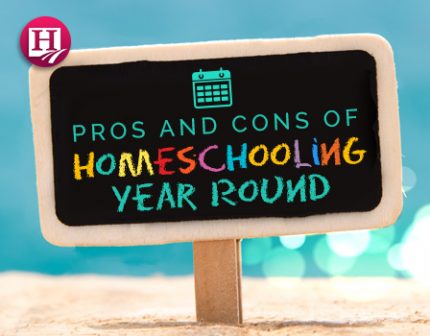
Pros and Cons of Homeschooling Year-Round
May 9, 2018Is it time for a break? Do you have it in you to homeschool year round? The answer to these questions depends on what makes your family happy. For some, looking forward to that annual break is a huge deal. For others, doing less work throughout the year makes more sense. We’ve put together some pros and cons to help you decide.
The Pros:
Homeschooling year-round does come with benefits, namely:
- Less work throughout the year – Many who homeschool year-round take the usual 180-day curriculum and spread it out over a longer span. As a result, students do less work each day but they still complete the
 curriculum in one year’s time.
curriculum in one year’s time. - More time off – As you may have guessed, homeschooling year-round provides you with more time to take off. Summer break usually lasts 2-½ months. Homeschooling year-round simply means working those 2-½ months into your school year by spreading them out.
- Skills stay sharp – Since you’re not taking a long summer hiatus from school, those academic skills you work so hard to sharpen will stay sharp! Because of this, you won’t waste any time re-teaching or doing the review that’s in the beginning of most textbooks.
- Children advance at their own pace – For some students, this means completing two books (in the same subject) in one year. For others, it means doing a subject every other day instead of every day.
- Boredom buster – There will pretty much never be a time when you’ll hear, “I’m bored” if your kids do the same things every day.
The Cons:
The flip side to all of this is that there are certainly some challenges involved in year-round homeschooling:
- You never get a real break – Since you’re homeschooling day in and day out, there’s never that “break” to look forward to. Sure, you can take off days here and there, but it isn’t the same as taking weeks off to do next to nothing!
 It’s too easy to fall behind – One thing we have to be vigilant about when doing year-round homeschooling is the tendency to fall behind. We may feel like we have all the time in the world to get things done and so what’s one random day off? There’s nothing wrong with that, provided you don’t make a habit out of it. Otherwise, those “random days off” can accumulate into falling behind.
It’s too easy to fall behind – One thing we have to be vigilant about when doing year-round homeschooling is the tendency to fall behind. We may feel like we have all the time in the world to get things done and so what’s one random day off? There’s nothing wrong with that, provided you don’t make a habit out of it. Otherwise, those “random days off” can accumulate into falling behind. - Your kids may complain – Although kids generally like the idea of doing less school each day or doing a subject every other day (or however you arrange it), you may also hear them gripe that the rest of the world has a summer break but “we never do!” You can address this by promising they can start later in the day during summer and still sleep in. Or, perhaps you agree that summer schooling is very light, not taking on any big projects or anything time-consuming.
Where to Go From Here:
Now that you have the pros and cons to think about, where do you go from here? It’s important to take inventory and decide whether the pros outweigh the cons or vice versa. There is no “wrong” answer. The only answer is the one that will work for your family. And, it may not be what you do every year; what works this year might not be what works  next year and so on.
next year and so on.
With everything before you, though, take your learners into consideration. What do they want? What is best for their learning style? What does your spouse want? Ultimately, what do you – the teacher – want? Children are usually more receptive when we’ve given them a platform on which to speak. In doing so, you’ll likely figure out just what works for your family.
Tasha Swearingen
Tasha is a homeschooling mom to 5 and has been homeschooling for 14 years. Currently, her children's ages span from toddler to young adult. Tasha has a Bachelor's of Science degree in Social Sciences from Florida State University and is working on her MBA through SNHU/Berklee School of Music.
Latest Posts

While nearly every college and university today is eager to accept homeschooled students into their institutions, homeschooling families need to understand that their student’s application…
Read more >
Guest Post by Gabriel Morse For several years, I sat for long hours every day behind one of those battleship gray desks in a windowless, dull, gray office. The pay was enough to take care…
Read more >
This post is sponsored by Little Monsters Universe. I'm Tina Salmanowitz, an advocate for homeschooling and science education. With over a decade of experience as a science educator (in class…
Read more >

